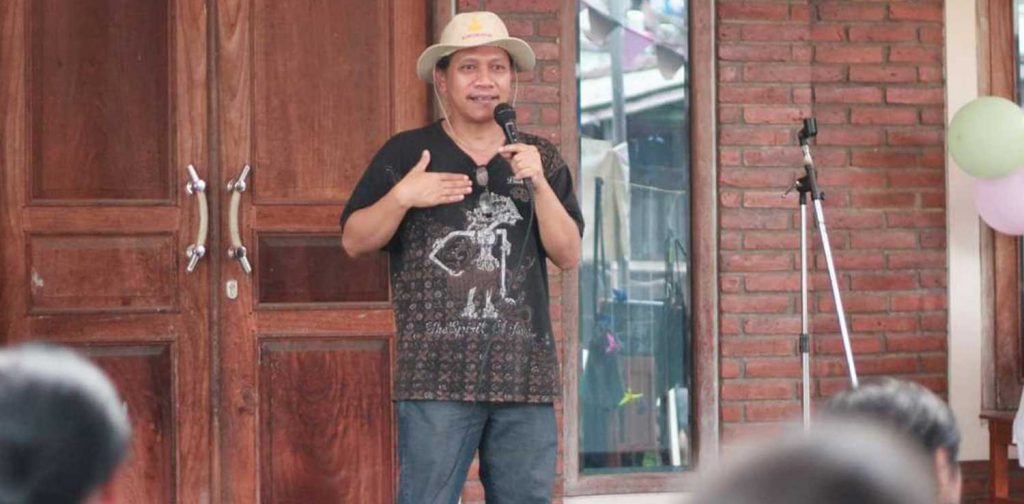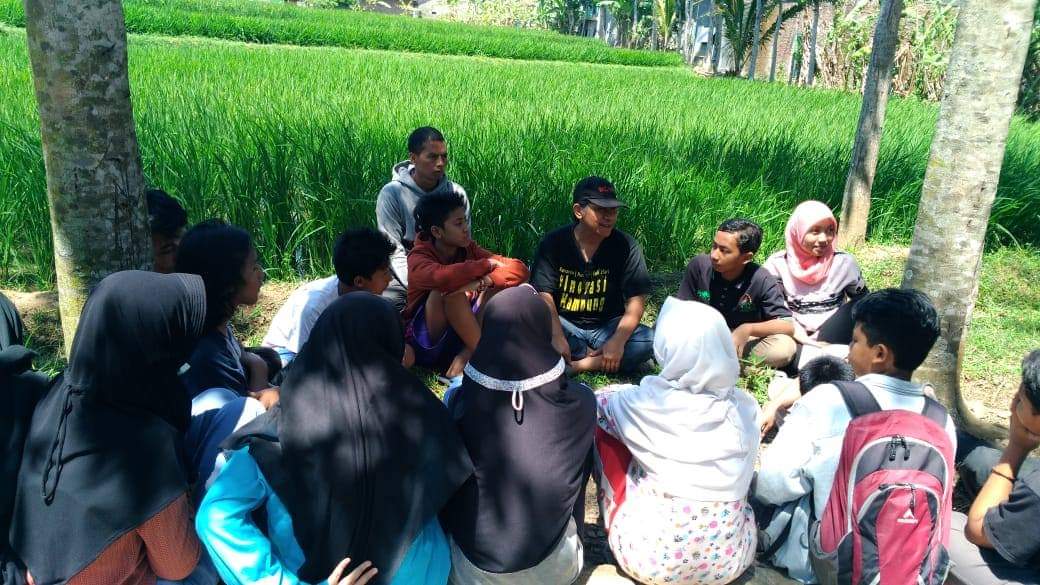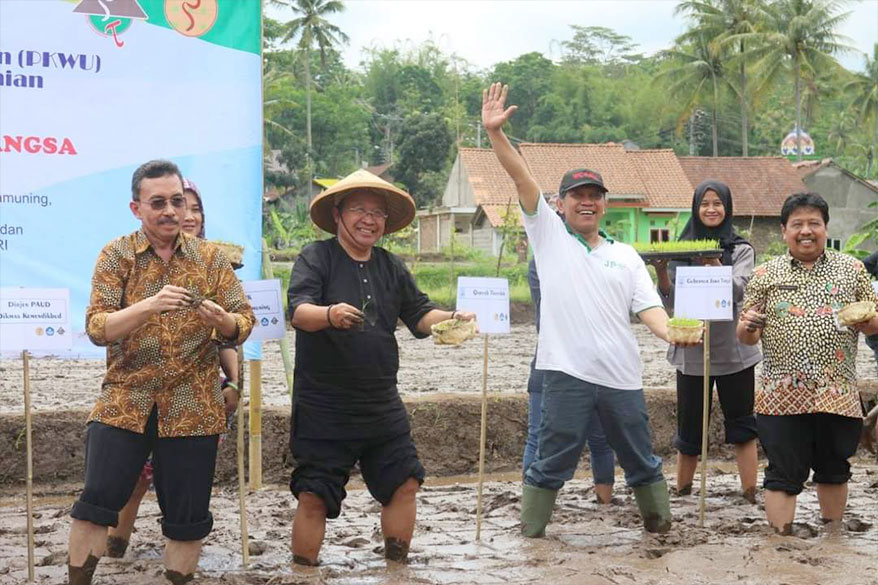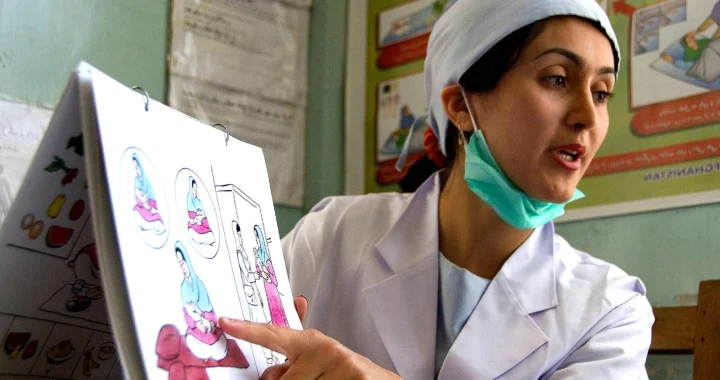How the Production Congregation Alleviates Poverty

In frame: Ahmad Bahruddin at the Qaryah Thayyibah Learning Community Work Exhibition
Today marks more than two decades since Ahmad Bahruddin and his colleagues founded the Qaryah Thayyibah Farmers’ Union (SPPQT) in Salatiga, a beautiful mountain city in Central Java Province of Indonesia. SPPQT is a forum to empower smallholder farmers and alleviate poverty that was established in 1999.
Not only empowering farmers and communities, SPPTQ also takes part in environmental conservation initiatives, e.g., the construction of 930 units from the target of 2,500 infiltration wells has successfully increased the Senjoyo spring’s water discharge significantly.
Through SPPTQ, Bahruddin also established an alternative education forum called the Qaryah Thayyibah Learning Community (Komunitas Belajar Qaryah Thayyibah – KBTQ) in 2003. This work has led him to be a member of the National Accreditation Board for Early Childhood and Non-Formal Education at the Ministry of Education from 2018 to 2022.
The following is the documentation of Bahruddin’s interview with Zia Ul Haq from Green Network on Friday, 07 May 2021.

You are renowned as an empowerment activist, especially among farmers and communities at the grassroots. What are the major social problems you see in society?
In my opinion, until now, there is no well-organized collective management of agricultural resources. Communities have not managed their production businesses properly, with no careful planning and no evaluation of their business development.
What have you and your community done to seek a solution to this problem?
We have facilitated the formation of “Production Congregation,” which involves various parties, especially villages’ young men and women.
How is Production Congregation in practice?
Yes! In the form of the smallest community-based business group. Its legal entity could be a primary production cooperative, not a savings and loan or trade one. This movement must involve all low-income families in the community, in which representatives from families are preferably young women.
These primary production cooperatives are obliged to conduct intensive and periodic deliberations, then collaborate to establish a multi-purpose secondary cooperative. It is also necessary to cooperate with the village government to function this secondary cooperative as a village-owned enterprise.
If this movement can be expanded or implemented in all community points in Indonesia, this movement can eradicate poverty. Because, with this movement, the poor can empower themselves by carrying out production based on existing agricultural resources and not charitable programs.
Until 2015, the Production Congregation had spread across 17 cities or districts in Central Java with more than 17,000 members. In Salatiga alone, there are 26 Production Congregation groups with 500 members.
What are the main goals of the Production Congregation apart from alleviating poverty?
Our hope is that this Production Community will develop economic independence and political sovereignty of the citizens through intensive deliberation. That includes educating and generating critical reasoning for injustice, including unfair relations between men and environmental injustice.
Is that what made you start the Qaryah Thayyibah Learning Community?
Well, yes. More or less so. Just imagine, there are many elementary schools in the village, but none teach about their town. The current education system creates a distance between students and their surroundings, also from their villages. Students never get the chance to be exposed to the potentials and the problems around them, only being fed by various central-made subjects taught uniformly to students throughout Indonesia.
Ideally, in education, students should be active-productive subjects, not passive-consumptive objects. As human beings whose nature is to think, so far, students have been reduced to being ‘animals,’ in my opinion, because they only wear their school uniforms but lose any critical process.
Where is the position of the government in the Congregation movement? What kind of policy do you expect from the government?
The government should fully support and furthermore targetting the ideal Production Congregation in each neighborhood (RT). The community needs a serious commitment from the government to facilitate it intensively with measurable targets by realizing “a million” Production Congregations in each community.
During his 2017 visit to SPPQT, President Joko Widodo fully appreciated this Production Congregation movement. In 2019, I then conveyed directly to the Village Minister, Abdul Halim Iskandar, about the maturation and refinement of efforts to create an independent village without corruption, namely through sustainable agrarian resource management programs that bet on togetherness and community cooperation at the grassroots.
At that time, Minister Halim responded very positively and immediately ordered his Director-General to execute the program by modeling hundreds of villages of different classifications, including archipelagic villages, to be replicated in more than seventy thousand villages throughout Indonesia.

Have you and your community been working with companies and investors to work on joint solutions? What are your suggestions for them?
Yes, and my advice to the owners of capital is: Rest assured that the realization of people’s empowerment contains excellent benefits for the owners of capital, although indirectly, in the form of qualitative advantages. In addition, it will also have the potential to provide direct financial services eventually.
What are your suggestions for the community that independently forms Production Congregation in the regions? Are there any steps?
The steps for forming a Production Congregation are pretty simple. First, identify the families in the smallest community and involve all families who have been disadvantaged economically and socially. Second, invite representatives from the family, but prioritize the family members who are still young and women.
Third, hold deliberations to organize joint ventures, relying on their strengths with the village resources. Fourth, register the Production Congregation formed to the cooperative office as a primary production cooperative instead of savings and loans or trade, to hold intensive and periodic deliberations in this primary production cooperative.
Fifth, involve the other primary production cooperatives to set up multi-purpose secondary cooperatives, which will serve the business financing and product marketing of the members’ primary production cooperatives—collaborating with the village government to participate in this multi-business secondary cooperative also functioning as a village-owned enterprise.
That’s all the steps. Let’s do this kind of community power-building right now—no need to wait and depend on anything or anyone. If you can stand up and be independent, the regents, mayors, governors, or anyone else will flock to support you one day.
Translator: Aliyah Assegaf
Editor: Marlis Afridah
To learn the original version of this article in Indonesian, read Green Network ID.

Co-create positive impact for people and the planet.
Amidst today’s increasingly complex global challenges, equipping yourself, team, and communities with interdisciplinary and cross-sectoral insights on sustainability-related issues and sustainable development is no longer optional — it is a strategic necessity to stay ahead and stay relevant.

Zia Ul Haq
Zia is a Reporter at Green Network Asia. He graduated from UIN Sunan Kalijaga Yogyakarta with a bachelor's degree in Islamic Education. He is currently a Learning Companion at Qaryah Thayyibah Learning Community (KBQT).


 Data Center Boom: Looking at India and Beyond
Data Center Boom: Looking at India and Beyond  Assessing Indonesia’s Step into Global Carbon Markets
Assessing Indonesia’s Step into Global Carbon Markets  Prioritizing Finance for Nature for Healthy and Resilient Ecosystems
Prioritizing Finance for Nature for Healthy and Resilient Ecosystems  Integrating Indigenous Practices into Australia’s Defense Against Heatwaves
Integrating Indigenous Practices into Australia’s Defense Against Heatwaves  Systemic Shift to Enable Healthy School Food Environments
Systemic Shift to Enable Healthy School Food Environments  Looking into the Global Midwife Shortage
Looking into the Global Midwife Shortage